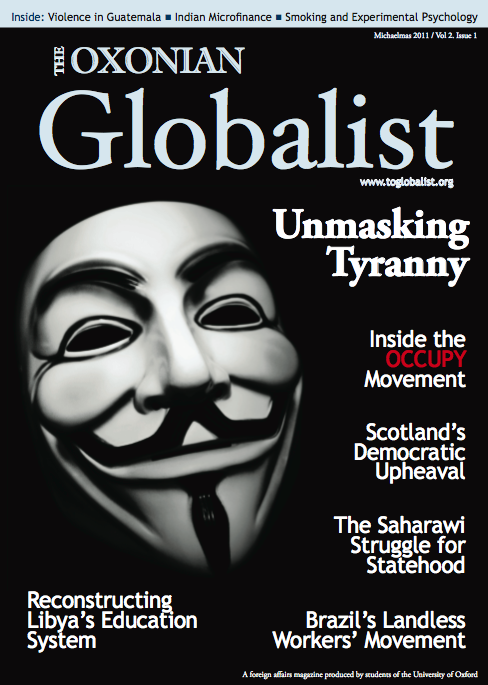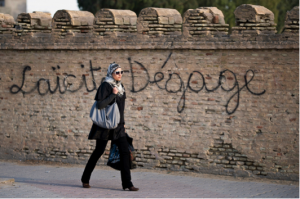On October 23rd 2011, roughly ten months after a distraught fruit vendor named Mohammed Bouazizi set himself on fire and ignited the wave of revolutions known as the Arab Spring, Tunisia held its first post-revolutionary elections, in which the moderate Islamist party Ennahda (meaning Renaissance) won a plurality of the votes and 89 of the 217 seats in the Constitutional Assembly. The party’s victory has stirred a debate both within Tunisia and outside about the relationship between Islam and democracy.
Ennahda’s history prior to the revolution has been one of repression. Under President Zine El Abidine Ben Ali, Ennahda was labelled a terrorist group and its members were imprisoned and tortured or forced into exile. Furthermore, Islamic practices such as wearing head scarves or growing beards were highly frowned upon and mosque attendance was viewed by the highly secular state with suspicion, despite the fact that 98% of the population identifies as Muslim. Ennahda’s popularity can therefore be viewed as a manifestation of some of this previously suppressed Islamic sentiment.
Despite the party’s Islamic identity, Ennahda’s leadership, and particularly Hamadi Jebali, the party’s Secretary General and the probable future Prime Minister, have made it very clear that they do not wish to impose Islam on the population, whether through dress codes or mosque attendance. Moreover, they claim to fully support the progressive elements of Tunisia’s secular society, such as the 1956 Code of Personal Status, a piece of legislation that ensures equality for women on issues relating to marriage and divorce. In an interview with Realités, a Tunisian magazine, Jebali insisted that the party will not be dogmatic, dictatorial, or totalitarian.
Yet some inside Tunisia fear the rise of an Islamist party such as Ennahda. Such fearmongering was the primary argument used by the Progressive Democratic Party (PDP) prior to the elections. In addition, several days after the election, in the town of Sidi Bouzid, the hometown of Bouazizi and the birthplace of the Arab Spring, protestors dissatisfied with the election results ransacked the local offices of Ennahda and burned down a government building.
These anti-Islamic and highly secular sentiments, however, represent a minority opinion, says Michael Willis, Director of the Middle Eastern Centre at St. Antony’s College, University of Oxford and a specialist on Tunisia.
“There is a certain section of the elite in Tunisia,” he says, “that is in favour of the French model where religion is completely banished from public life. They are a small minority of the population. If you look at the election results, the parties that advocated for secularism just got a handful of the percentage of the vote and they weren’t supported, whereas Ennahda got 40% of the seats.”
This analysis is confirmed by the case of the PDP, a staunchly secular party that consistently attacked Ennahda’s Islamist identity which, despite being perceived as relatively influential among voters, received only six seats in the assembly.
Willis emphasises, however, that Ennahda does not wish to impose Islam on the population, but rather protect the right for people to practice it, a right that did not fully exist under Ben Ali nor under his predecessor Habib Bourgiba.
“They [Ennahda] say they understand the secularization of Tunisian society and they don’t want to change a lot of the fundaments. They just want to be able to allow a space for religion.”
The fear of Ennahda outside of Tunisia may be linked to the potential affect Ennahda’s victory could have on other Arab Spring countries, particularly Egypt where the revolution has empowered the Muslim Brotherhood, to whom Ennahda has been historically linked. Predictably, anti-Islamic commentator Daniel Pipes raises fears that Ennahda will support Islamic terrorists groups and views them as a blight, and even goes so far as to suggest that Ben Ali would be a better alternative. Willis however cautions against such fearmongering, emphasising that Ennahda has always been one of the more liberal of the Islamist movements.
“Most other Islamist movements in the 80s and 90s were critical of it and thought that it was far too moderate,” says Willis.
He adds that of all the Islamist parties in the Muslim world, it is not the Muslim Brotherhood but rather the Justice and Development Party in Turkey, known as the AKP party, that Ennahda has most closely associated itself with publicly. Willis says that like the AKP, Ennahda wants to create a society that is Islamic, but at the same time democratic, with a strong emphasis on economic growth, and with good relations with the West. These goals, particularly the last one, belie the fears raised by Pipes.
Ultimately, Ennahda’s victory may have a much more positive effect than Pipes is willing to admit. The party is now poised to demonstrate that Islam and democracy are compatible and that Islamism does not have to be represented by extremists such as Osama bin-Laden and Al-Qaeda.
“They [Ennahda] say that we have a real chance of showing that you can be an Islamist and you can be democratic and you can work with people in a pluralist society and it won’t create the sort of problems people think it does,” says Willis. “They say that you can bury the idea that Islam and the West aren’t compatible.”




